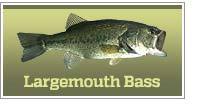Largemouth Bass
Guide to fishing for large mouth bass
By Rick Seaman
September 4, 2025
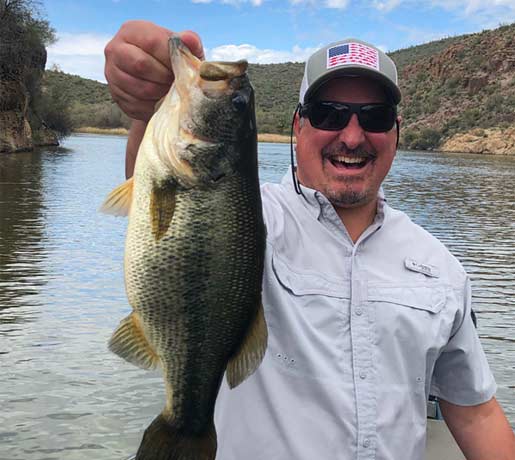
About Largemouth Bass
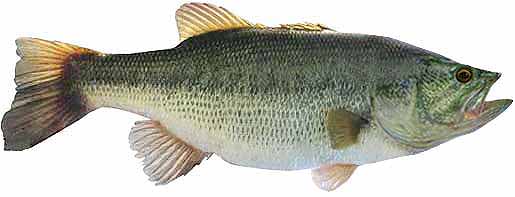
Of all the popular bass species pursued by anglers in the US, the largemouth gets the most activity. It is distributed across all but a few states and adapts to a wide variety of water depths, temperatures and clarity. They grow to larger sizes than their cousins - shoal, spotted, redeye or smallmouth bass.
These bigmouth bass can eat virtually any sport fish or baitfish in its surroundings in sizes up to about one third its body length. Sunfish are a favorite and the smaller ones are always at risk when largemouth are in the area. They are great fighters and can be caught by anglers of varied experience.
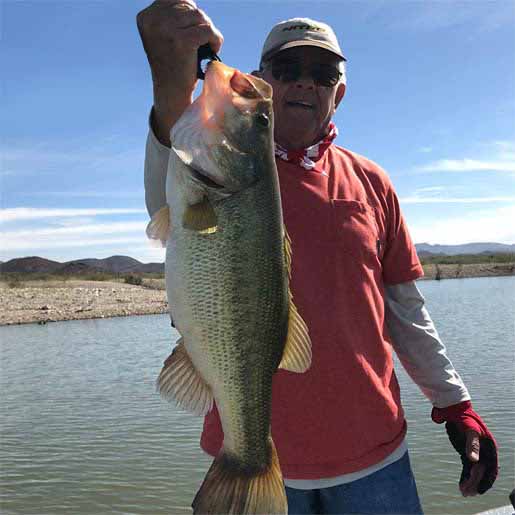
Feeding sprees are typically short, but may happen up to four times in a 24-hour period. Bass can also be enticed to strike for reasons other than hunger. Protecting their turf is one of the primary reasons they strike during non-feeding times. This natural inclination to protect their territory is accentuated during the spawn, and particularly in nesting areas. Sometimes they strike simply out of curiosity. Largemouth tend to spawn in shallow water in areas which have cover and are protected from prevailing winds..
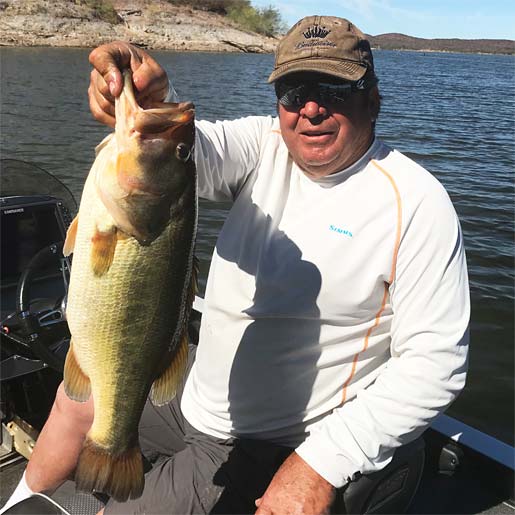
Largemouth Bass
Micropterus salmoides
Prefers slightly stained to murky water with cover and minimal current, in depths from one foot to sixty feet. Ideal water temperature: 60° to 80°
World record: 24 pounds, 4 ounces
Fishing For Largemouth Bass
It would take thousands of web pages to relay all that is known today, about bass fishing. However the most important elements of the equation are understanding the life cycle of bass, learning their seasonal migrations, identifying their food source in a given body of water, and figuring out where the ideal cover is for any given season. Generally, the baitfish and bass move in unison as seasons change. Finding the bait helps you find the bass. Fish finders are a big help in locating both.
The life cycle of a bass
Understanding the migration of bass over the seasons can send us in the right direction as we begin our search every day we spend on the lake.
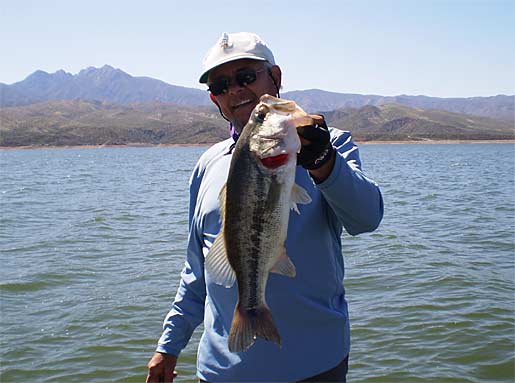
SPRING BASS FISHING
Top Baits: Spinnerbaits, crankbaits, topwater baits and soft plastics.
Fish shallow to moderate depths as the bass move into spawning coves and flats in search of food, seeking warmer water, and preparing for the spawn. Topwater lures are the most effective way to cover water, so start with buzzbaits, poppers, and chuggers. If the largemouth are not in the mood to come to the surface, try crankbaits around rocky shorelines or spinnerbaits around brush or wood. Worms and jigs work anywhere, experiment with retrieve and action until you find what the bass want. In clear water make long casts to cover potentially holding bass. Try shallow-water flippin on cloudy days or in murky water.
SUMMER BASS FISHING
Top Baits: Top water lures, crankbaits, Jigs and plastic worms.
Fish shallow in the mornings and evenings using topwater, crankbaits, and plastic worms and jigs. Move deeper as the sun rises. "Deep" can vary, depending on the overall depth of the lake you are fishing. In some lakes you may need to go as deep as 60 feet while others seldom hold fish below 25 feet. Jigs, worms and creature baits are some of the best baits for largemouth in deeper water, during summer. Try fishing with a drop-shot rig when the fishing is tough. Largemouth's often feed heavily at night during the hot summer months.
FALL BASS FISHING
Top Baits: Spinnerbaits, crankbaits and spoons.
As the lake begins to cool, bait and bass tend to move up into creek channels at a variety of depths, depending on conditions. At this time of year bass tend to focus on baitfish, so mimic them with spoons, spinnerbaits, jerkbaits and crankbaits depending on the depth you fine the bait and bass. Fish shallow to moderate depths in the mornings and evenings. Sunny, shallow banks tend to warm in the afternoons, so be sure to check the shallows on warm fall days. As the bass move deeper during the day move to outside deep structure and use spoons or jigs. Key on schools of bait as the bass will be nearby the food source.
WINTER BASS FISHING
Top Baits: Jigs, pork baits and soft plastics.
Try shallower structure and points in the mornings then move deeper as the sun rises. Bass are not very active in cold water, so move your bait slowly, and fish deep cover and structure. "Deep" depends on the overall depth of the lake you are fishing. In some lakes you may need to go as deep as 60 feet while others seldom hold fish below 35 feet. In some shallow lakes the maximum depth may be less than 20 feet. Find cover in the deepest water or focus on the location of schooling baitfish.
Daily Movement
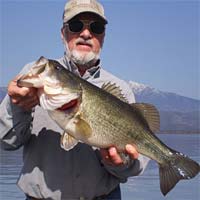 Largemouth bass have daily migrations - from feeding areas to deeper holding areas. This is true regardless of the season, however the depth range changes as water temperatures vary. Figuring out the timing of this movement is often a major key to increasing your daily catch. Visit the Bass Knowledge Center for insight on how bass live.
Largemouth bass have daily migrations - from feeding areas to deeper holding areas. This is true regardless of the season, however the depth range changes as water temperatures vary. Figuring out the timing of this movement is often a major key to increasing your daily catch. Visit the Bass Knowledge Center for insight on how bass live.
Top 5 largemouth bass fishing lures this year
Over time, these five baits have proven to be top producers all across the country when fishing for largemouth bass. See an array of good bass lure options here.
Spinnerbaits
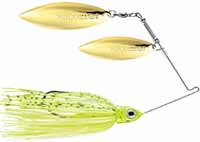 Use spinnerbaits when fish are feeding shallow in areas with thick cover. Vary retrieve speed to control depth. Pause to let the lure fall to deeper depths. Watch for hits on the fall. They are relatively weedless as long as the bait is moving.
Use spinnerbaits when fish are feeding shallow in areas with thick cover. Vary retrieve speed to control depth. Pause to let the lure fall to deeper depths. Watch for hits on the fall. They are relatively weedless as long as the bait is moving.
Crankbaits
 Use crankbaits when the fish are shallow on rocky, sandy or muddy areas with little or no brush. Crankbaits are particularly effective when bass are feeding, or otherwise aggressive.
Use crankbaits when the fish are shallow on rocky, sandy or muddy areas with little or no brush. Crankbaits are particularly effective when bass are feeding, or otherwise aggressive.
Topwater Lures
 Use poppers, like the Pop-R shown, as well as a wide variety of other topwater baits to draw fish out of cover. Cast near cover and vary the retrieve to see which action draws more strikes.
Use poppers, like the Pop-R shown, as well as a wide variety of other topwater baits to draw fish out of cover. Cast near cover and vary the retrieve to see which action draws more strikes.
Plastic Worms
 Texas style, open-hook jighead or stick worms, bass love them all. Pick the type that works best in the cover you are fishing. The key to the Texas Rig Worm is that the hook is buried into the body of the soft plastic worm. It is then weedless and can be worked through and over most cover without getting hung up. Use open-hook style around rock, sand and mud. Stick worms are ideal for pitching near cover of any kind, especially brush. Twitch, crawl and pause them - give them life to tease a bass into biting!
Texas style, open-hook jighead or stick worms, bass love them all. Pick the type that works best in the cover you are fishing. The key to the Texas Rig Worm is that the hook is buried into the body of the soft plastic worm. It is then weedless and can be worked through and over most cover without getting hung up. Use open-hook style around rock, sand and mud. Stick worms are ideal for pitching near cover of any kind, especially brush. Twitch, crawl and pause them - give them life to tease a bass into biting!
Jigs
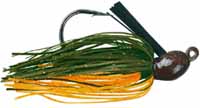 Jigs can be used to imitate crawfish or baitfish. They work well crawled slowly on the bottom or fished with a fast retrieve to imitate small fish swimming. Weedless jigs work well in most any type of cover, including brush and wood. Open-hook jigs work well on cleaner bottoms with little or no cover to get hung on. Use different plastics to create a variety of looks and fall rates. When bass are sluggish or you just want to go hawg hunting, this a great bait. Looks and feels natural to the bass. Work it slowly in cover.
Jigs can be used to imitate crawfish or baitfish. They work well crawled slowly on the bottom or fished with a fast retrieve to imitate small fish swimming. Weedless jigs work well in most any type of cover, including brush and wood. Open-hook jigs work well on cleaner bottoms with little or no cover to get hung on. Use different plastics to create a variety of looks and fall rates. When bass are sluggish or you just want to go hawg hunting, this a great bait. Looks and feels natural to the bass. Work it slowly in cover.
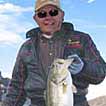 Rick Seaman is a fishing enthusiast with over five decades of fishing experience, a retired tournament fisherman, author of numerous published articles on fishing, and co-author of the book "Bass Fishing - It's not WHAT you throw, It's WHERE you throw it".
Rick Seaman is a fishing enthusiast with over five decades of fishing experience, a retired tournament fisherman, author of numerous published articles on fishing, and co-author of the book "Bass Fishing - It's not WHAT you throw, It's WHERE you throw it".
Related Articles
Bass lakes and fishing information by state
022824
Fishing Information



